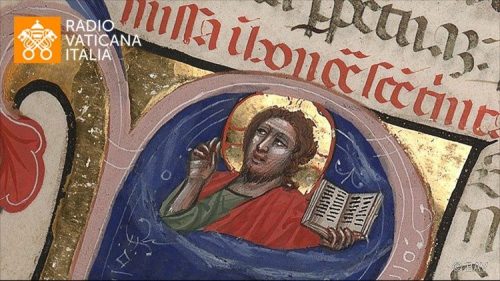READING OF THE DAY
2 TM 4:10-17B
Beloved:
Demas, enamored of the present world,
deserted me and went to Thessalonica,
Crescens to Galatia, and Titus to Dalmatia.
Luke is the only one with me.
Get Mark and bring him with you,
for he is helpful to me in the ministry.
I have sent Tychicus to Ephesus.
When you come, bring the cloak I left with Carpus in Troas,
the papyrus rolls, and especially the parchments.Alexander the coppersmith did me a great deal of harm;
the Lord will repay him according to his deeds.
You too be on guard against him,
for he has strongly resisted our preaching.At my first defense no one appeared on my behalf,
but everyone deserted me.
May it not be held against them!
But the Lord stood by me and gave me strength,
so that through me the proclamation might be completed
and all the Gentiles might hear it.
GOSPEL OF THE DAY
LK 10:1-9
The Lord Jesus appointed seventy-two disciples
whom he sent ahead of him in pairs
to every town and place he intended to visit.
He said to them,
“The harvest is abundant but the laborers are few;
so ask the master of the harvest
to send out laborers for his harvest.
Go on your way;
behold, I am sending you like lambs among wolves.
Carry no money bag, no sack, no sandals;
and greet no one along the way.
Into whatever house you enter,
first say, ‘Peace to this household.’
If a peaceful person lives there,
your peace will rest on him;
but if not, it will return to you.
Stay in the same house and eat and drink what is offered to you,
for the laborer deserves payment.
Do not move about from one house to another.
Whatever town you enter and they welcome you,
eat what is set before you,
cure the sick in it and say to them,
‘The Kingdom of God is at hand for you.'”
WORDS OF THE HOLY FATHER
Pope Francis reflected on the “missionary work of the Church” and on the characteristics required of those who are “sent to proclaim God’s Word”, during Mass at Santa Marta […], the liturgical feast of Saints Cyril and Methodius. He described the two Saints as being “skillful heralds of the Gospel” who had “risked everything” and had “made Europe stronger”.
The Pontiff’s reflection was inspired by the day’s collect prayer, which called on “all people — all men — to welcome God’s Word and become holy people loyal to God”. “If it is necessary to ‘receive the Word’”, the Pope said, then “there is a need for sowers of the Word, missionaries, true heralds”. He pointed to Saints Cyril and Methodius as examples, saying they were “skillful heralds who had spread the Word of God and were even able to do so in the language of the people so that they could understand it”. The day’s liturgical readings were also about missionary work, with Jesus sending forth his disciples (Lk 10:1-9), and Paul and Barnabas also being sent out (Acts 13:46-49).
Pope Francis asked what traits should be found in the “personality of an emissary, an emissary charged with proclaiming the Word of God”. Three characteristics emerged. Firstly, Pope Francis said, “it is said that Paul and Barnabas spoke with frankness”. Thus, God’s Word must be transmitted “with frankness, that is, openly, even with strength, with courage”. He explained that these characteristics are to be found in the translation of the Greek word, parresìa, used by Paul in the Bible. This means, the Pontiff added, that “the word of God cannot be brought as a proposal — ‘if you like’, or as a good philosophical or moral idea — ‘you can live like this’”. Rather, “it needs to be introduced with this frankness, with this strength so that the Word may penetrate, down to the bone”.
“The person without courage — spiritual courage, heartfelt courage, who is not in love with Jesus, from whom courage comes”, Pope Francis said, might “say something interesting, something ethical, something that will do good, philanthropic good”. He pointed out, however, that God’s Word shall not be found in him and therefore, “he will be unable to form the People of God” because “only God’s Word proclaimed with this frankness, with this courage, is capable of forming God’s people”.
The second characteristic required by the Lord’s emissaries is found in the bible passage in which Jesus says, “the harvest is plentiful but the labourers are few; pray therefore the Lord of the harvest to send out labourers into his harvest”. Because, Pope Francis said, “the Word of God must be proclaimed through prayer”, and this should be done “always”, he stressed. In fact, he added, “without prayer, you may offer a good conference, good education, good, very good, but it is not God’s Word”. Indeed, “only from a heart in prayer can God’s Word issue forth”, he explained. Prayer is therefore necessary “so that the Lord may accompany the sowing of the Word, and the Lord may water the seed so that it may sprout”, he concluded.
Another “interesting” passage from the Gospel, he said, reads: “behold, I send you out as lambs in the midst of wolves”. What does this mean? “The true preacher is one who knows he is weak, who knows he cannot defend himself from himself”, Francis explained. The emissary “in the midst of wolves”, he continued, could object and ask, “but Lord, so they might eat me?”. And “the answer is”, he stressed, “Go! This is the way”. The Pope then recalled “a most profound reflection” by John Chrysostom: “if you do not go out as a lamb but go as a wolf among wolves, the Lord will not protect you; defend yourself on your own”. Thus, Francis continued, “when the preacher believes he is too intelligent or when one who has the responsibility of issuing forth the Word of God tries to be sly” and thinks “I am getting along with these people”, then “it will end badly”, or “he will negotiate God’s Word with powerful and arrogant people”.
In support of this thought, the Pope told the story of an event which, he said, “I don’t know whether it’s true or not, but it is helpful to reflect”. It is the story of a person “who boasted about being good at preaching God’s Word and who felt like a wolf”, saying: “‘I have strength; I have no need; I am not a sheep’”. Later, “after preaching, he went into a confessional and was approached by ‘a big fish’, a great sinner”, who “wept and wept” over “his many sins”, the Pope continued. “Being remorseful, he wanted to ask for forgiveness”. Pope Francis said that the confessor, thinking that this was a result of his preaching “began to swell with vanity and asked the penitent, ‘tell me, which part of the Word of God that I spoke about touched you the most, and made you feel that you must repent?’”. And the reply was, the Holy Father continued, “it was when you said, ‘let us move to another topic’”.
Pope Francis presented this anecdote to illustrate that “when the person charged with bringing God’s Word does so self-assuredly and not like a lamb, it all ends badly”. If he does so “like a lamb, the Lord will protect the sheep”, the Pope continued. “The wolves will not be succeed. They might kill you, but your heart will remain faithful to the Lord”, he said.
“Thus is the missionary work of the Church”, the Pope observed. “This is the way the Word of God should be proclaimed”, he continued, adding, “this is how great missionaries are, the ones who proclaim the Word, not as their own, but with the courage, the frankness that comes from God”. Because, he said, “they do not feel they are great; they pray”. Indeed, “the great heralds who have sowed and have helped the Church grow in the world; they were brave and humble men of prayer”, Francis said. After all, he added, “Jesus himself tells us, ‘when you have done all of this, you say: ‘I am an unworthy servant’”. Indeed, Francis explained, “the true preacher feels unworthy because he feels it is the strength of God’s Word which brings forth God’s kingdom”.
Thus the invitation is to pray to Saints Cyril and Methodius, “Patrons of Europe, heralds of the Gospel, that they may help us proclaim God’s word with courage with prayer and humility”, Pope Francis concluded.
(Santa Marta, 14 February 2017)

